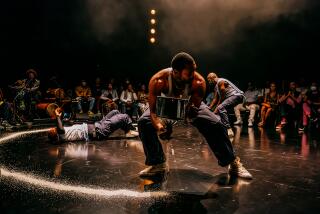STAGE REVIEW : Gurney’s ‘Cocktail Hour’ Is Sober Slice of Life
A.R. Gurney may be the closest thing America has to Britain’s Alan Ayckbourn. One doesn’t laugh quite as loud or as hard at Gurney’s plays, draped as they are over a rigid New England frame, but both men have a sense of life’s geometry that they love to translate into theater.
Take Gurney’s “The Cocktail Hour,” which opened Wednesday at the James A. Doolittle Theatre. This is a mirror play about a son’s visit home to get permission from his father to put on a play that he has written about that father and the rest of the family. Simple.
Except that you soon realize that the play you’re watching cuts close to the play in question. And we soon know precisely why the son’s request unleashes such strong reaction in the parents. It is art imitating art imitating life.
Pure geometry. Gurney’s earlier “The Dining Room” is a play about a room and the generations of people passing through it, acting out their pent up little dramas. More geometry. Gurney’s “Love Letters,” which opened Tuesday at the Canon Theatre, presented parallel lives connected by words crossing the literal and philosophical miles dividing the writers. Again, geometry.
Gurney’s territory here as ever, is WASP land--the affluent White Anglo-Saxon Protestant fiefdom of repressed emotions, stiff upper lips and churning stomachs in which he grew up. Central to “The Cocktail Hour” is the cocktail hour--the sacred real one (which “took the place of evening prayers”) and the play of the same title that son John has written ( encore geometry). Gurney has gone to the altar this time: the daily ritual of an aging, rigidly conservative upper-middle class, in this case at odds with a progeny wanting to break free.
Elder son John (Bruce Davison), a publishing executive who is visiting for the weekend to secure permission to put on his infamous play, tangles lightly with his parents--Bradley (Keene Curtis) and Ann (Nancy Marchand). It is done drink in hand, in a welter of genteel conversation behind a veneer of good manners, and interrupted only by the casual visit of John’s younger sister, Nina (Holland Taylor), who lives in this same Upstate New York town.
But things quickly get as heated in the living room as they do in the kitchen, where the new maid is burning dinner. This inordinately extends the cocktail hour, loosing tempers to speak more truth from behind diminished defenses.
It’s soon clear that John has never felt valued by a father who’s always liked his younger brother best; that Bradley takes a dim view of John’s efforts in general, but his playwriting ones in particular; that Ann wishes John would write books instead of plays (“books are quieter”), and that the terminally bored Nina, who yearns to go to Cleveland to work with seeing-eye dogs, is furious at having only a minor role in John’s play when she has such a major one in her parents’ lives.
By the second act, disruption is complete. Confrontations abound, facades crumble, confessions bubble up and all that WASP hypocrisy is cathartically unmasked.
“The Cocktail Hour” at the Doolittle is the very one that originated in June, 1988, at the San Diego Old Globe, traveling from there to a lengthy and respectable run at New York’s Promenade before returning to Southern California. It takes place in Steven Rubin’s same stylish New England interior, dotted with elegant 18th and 19th century pieces, and benefits from Globe artistic director Jack O’Brien’s finely tuned direction.
We’re in luck that the cast too is the same, having merely refined what had been splendidly synchronized performances from the start: Davison as a mass of controlled frustrations prime for Act II’s provocations and explosions; Curtis as a model of smug and mildly distracted self-satisfaction; Marchand as the sly, unruffled Ann, who’s a lot savvier than she lets on--and Taylor’s scattered, mildly desperate Nina who finds Big Brother a savior in the end.
The dialogue sparkles, the zingers fly and Gurney finds ways to cleverly take on a variety of tantalizing subjects--the antediluvian state of theater, the anachronistic absurdity of writing plays (which he compares to carving a corner of a Gothic cathedral in a computer society) and, of course, the mysterious critics (“Who are these people anyway?”).
Ultimately, this is top drawer drawing-room comedy and social commentary that never quite makes the leap to Major Play. But this writer, who had reviewed the original at the Old Globe almost 2 years ago, found a lot more to relish this time around--perhaps because the performances have become so expert. It is witty, literate entertainment for lovers of the well-made, linear play.
At 1615 N. Vine St., Hollywood, Tuesdays through Saturdays, 8 p.m.; matinees Thursdays, Saturdays and Sundays, 2 p.m. Until July 1. $26-$36; (213) 410-1062 or (714) 634-1300).
More to Read
The biggest entertainment stories
Get our big stories about Hollywood, film, television, music, arts, culture and more right in your inbox as soon as they publish.
You may occasionally receive promotional content from the Los Angeles Times.










